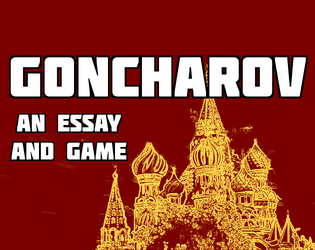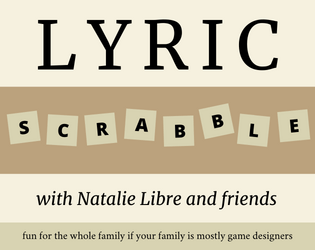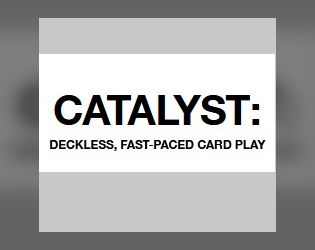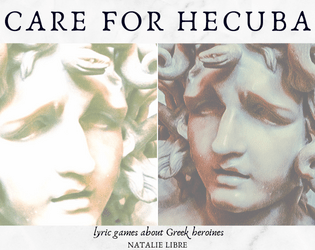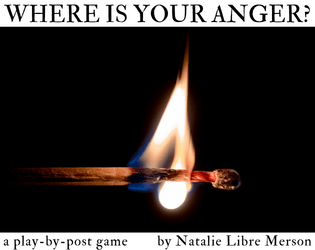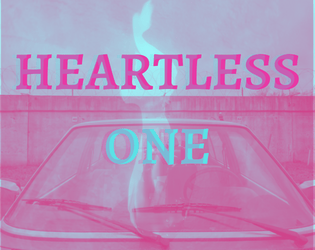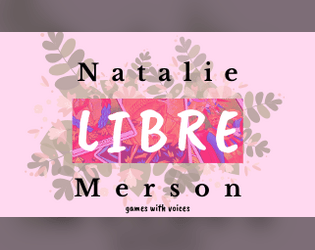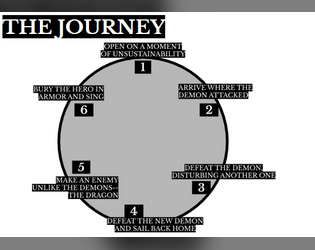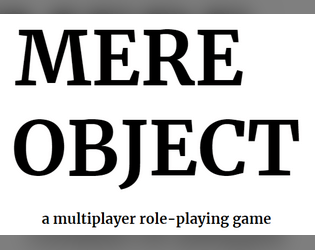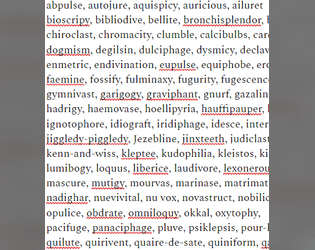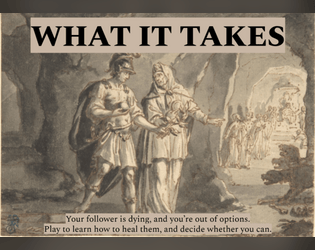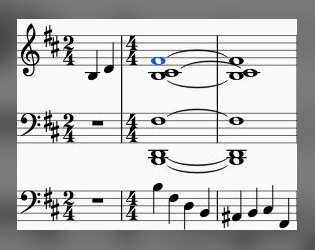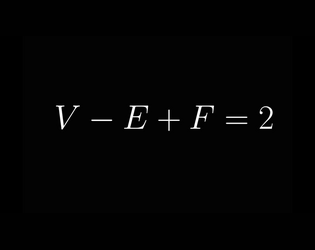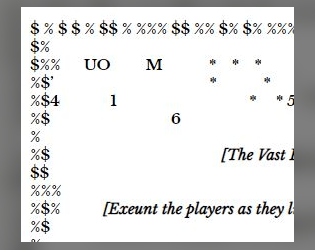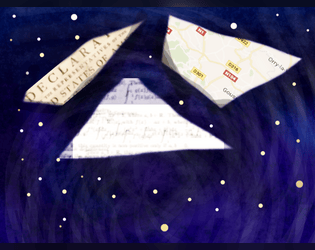Oh worm?? thank you so much
Hy Libre!
Creator of
Recent community posts
MOMENTUM
For two players.
At the end of each turn except the first players' turn, players count their current levels. If one player has more, they get the Flag. If they already had the Flag, instead they get a point. The first player to 3 points wins. (The Flag is not a card or object; nothing in the game can interact with it.)
This Scenario is another battle for Levels, but it makes sure that "fast" decks can be beaten without simply destroying the object that's scoring them points. It incentivises knowing when to use your short bursts of points and evaluating which player will win a very long game. Generally, cards that are fun or interesting in Threshold will also be so in Momentum.
Be warned that games in Momentum might go long, as the Flag sloshes back and forth-- they might even come down to which player runs out of cards in their deck first! At the same time, they might also be decisive battles where players win without using all their potential tools. If you favor a particular game speed, you might like other Scenarios better. If you're open to a mix of slow and fasts games, you enjoy analyzing who's winning, and you like it when every card is an interactive tool instead of just those that say "damage", you'll probably love it!
LIMIT PARTY
For two players.
At the beginning of each player's turn, their opponent names a very high number, like a trillion trillion. At the end of that turn, if the active player has at least that many levels, they win the game.
This is essentially "first to do an infinite combo wins"! You'll want to build decks accordingly-- your Threshold or Momentum deck might not even have an infinite combo, in which case you can't win! In practice, you don't even have to name the numbers-- just the easiest way to define "infinite combo" is "bigger than whatever really big number you name, no matter what".
I love this game so much! A friend asked me what a roll-and-write is and why they were fun and my response was "Here, play this game called Tiny Islands". It's clever and satisfying, and it even makes cute little maps at the end! It's surprisingly deep, too-- I was amazed when I realized the amount of thought I could put into just one choice, and it always feels good when you shape your island thinking about beach or boat placements and it pays off!
I'll echo some of the sentiments below: I'd buy this on the Android store, and I'd love the ability to seed the run. Often what happens is I show somebody the game, we both play the daily, and they're like "That was fun, can we play again?", and it'd be cool to be able to play on the same seed as my friend.
And I guess I should follow the rules, huh?
Mere Object is my game for #YourMoveJam, about looking at scenes through a lens of things.
What It Takes is my game for #CureLightWoundsJam, about how far you'll go to heal somebody. It has ritual elements and groveling toward indifferent gods!
Riley Rethal's "Best Day Ever!" is a game that sells you the fantasy of Phineas and Ferb. It's quite clever and compact, even emulating the B-plot.
"(Charlie Loves) The Spring & The Fall" is a game about a cat. It's one of the only games that's ever made me cry.
--Paul Czege's "Bacchanal" is a very horny Game Chef game that uses a lot of dice.
--E.E. Coli's "Fatimah's Busy Day" is maybe the densest 200-word game I can think of, even though it's elegant and very easy to read.
I guess I'll start.
I'm Natalie Libre! I rather like bears. Such a simple animal.
Some games I'd love to respond to:
--Riley Rethal's "Best Day Ever!"
--"(Charlie Loves) The Spring & The Fall"
--Paul Czege's "Bacchanal"
--E.E. Coli's "Fatimah's Busy Day"
- Collaborate with somebody. You can use the forums to find people.
- Your game has to be a "response" to another game, whatever that means. You can use the forums to find those, too.
- Make sure anybody who asks can get your game for free. If you can and want, make your game PWYW.
- Don't write hateful bullshit, use content warnings, et cetera. The basics.
Submit as many entries as you want, but collaborate with a different person each time.
- Who is the target of this spell? Why are they wounded? Will you be able to cure everything?
- Who is the target of this spell, and by extension your spell, fighting?
- What does the process of casting this spell look like? Do you ask zero, one, or many gods for help? Who gets credit/blame?
- What does healing really mean?
- What is the outcome of your roll? How is it decided?
Any more?
What a lovely encapsulation of the show! And what an elegant design.
I especially love that rolling your number means you go to the B-plot, which is a natural timer for the game-- everything just fits together so elegantly, and this feels like a game that NEEDS the L&F core rather than just has it for convenience. I also love the special abilities, particularly the FAN and the VISIONARY-- it's fun to imagine the two plots intersecting with an audience of sorts, as well as having someone who is incentivized to dream even bigger at least twice per game.
I found Blep!
On the way I documented:
--A strange temple that seems to store food for the priestly class
--A giant metallic beast with a visible stomach
--A strange plant
--Handwritten language
--The existence of large societies (20 humans!)
--Blep, who seemed to have grown quite a bit (they were much larger, with more humanlike hair, and they seem to now own hard shoes that I can't seem to break off).
I was very happy to find Blep.
Oh my god I thought you were joking about the d1000 table.
I was delighted to discover that my wish was "dueling banjos as gay sexual metaphor", because it felt like the game really did know what I needed to wish for. I was also delighted to ask my friends if they had a tarot card to tape to my face.
What I'm trying to say is, you've made a unique and wonderful experience.
most mathematicians aren't very concerned with whether their proof maps onto the real world...
I'd agree. The point of math is that it is an a priori science, as one of my teachers called it-- that is, hypothetically you could "do" mathematics by some standard without any experience of being in the world. However, some mathematicians believe that it's an empirical science or, alternatively/also, that while problems could be solved by Bertrand Russell's Dasein-less robot, to "do math" is to be able to present, communicate, and understand a proof's structure intuitively. I lean more toward that last one (could you tell) and I think it bleeds into this game. Along with, of course, a surprisingly noncontroversial belief that "math is art".
re: Outsideness in criteria for proof
I'll have to read that book. What you describe seems like a really, really strong brand of the Quine-Duhem thesis, and I dig it. At the same time, there's a fun tension between "beliefs can't entail beliefs" and "phil math can suggest aesthetic beliefs and vice versa". Not a contradiction, I don't think, but a tension that might actually be where the fun in this game lies.
First, randomizing methodologies is a way of getting Outside
I'm glad you said this, because I think you're right. The other justification I found (which is not at odds with this one, of course) is that any of the six rolls are a valid course of action for getting somewhere. This is good for two reasons. The first is that the goal you set is not necessarily the most interesting part of the problem-- and, if we are interested in mathematics as art, our goal is to invent/discover/notice/formalize beauty, wherever we find it. The second is that, unlike in science or philosophy, in mathematics beliefs directly entail other beliefs-- specifically, all beliefs in a given worldview are entailed by its axioms. In other words, if you keep walking in the forest, you'll eventually get everywhere, not just somewhere.
I'm interested in your belief that (if I'm reading right) removing the randomness preserves the Outsideness. I mean, obviously I wrote the game in a way that implies it, and it's a pretty good manifesto bullet point for the jam. But, writing this, I think that the advanced variants are advanced because they require inside-Outside synthesis, which is rather hard considering we don't even know what that means. I mean, how are you supposed to know when there's another way, or whether there really is a meaningful iceberg? And technically, looking back, I'm uncertain about the meaning of Whenever you cannot solve a problem and Whenever you can solve a problem as joint triggers. The obvious interpretation is "oh, so like, whenever you want" but I think it requires synthesis.
Side note! So now we've written, like, three study guides of text about the study guide, which to be honest is a design philosophy I hold dear-- Whenever it is possible, answer a text with its own form. That is, to respond to poetry, write a poem; to state something about games, write a game; and so on, and so forth. This isn't always possible or even advisable (or even a posteriori)-- using only that rule disallows most metaphors, for example. But this game believes a lot of things, and the point is that I don't believe they can be summarized without creating a game. (Not that this posting isn't valuable, of course-- it's obviously pretty informative, and besides summary isn't the only thing to glean from a text.)
All of this points to an approach to knowledge acquisition that's open and syncretic, that allows input from other, inherently incommensurable ways of knowing.
I think so. The fact that you're explicitly told to view the game as "the tip of an iceberg" or whatever you roll probably seals this pretty nicely.


